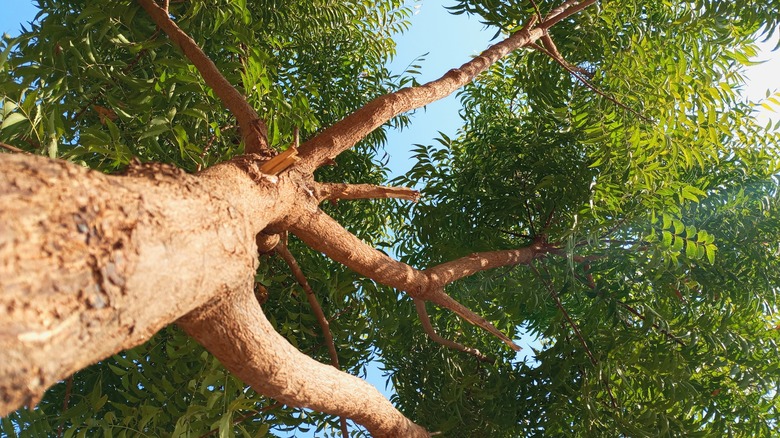Plant A Neem Tree And Watch Your Garden Reap The Benefits
The neem tree (Azadirachta indica) is a remarkable addition to any garden, offering more than just natural beauty. Known for its resilience and versatility, this plant has been used in gardens for centuries due to its applications in medicine and agriculture. Originating from the Indian subcontinent, the neem tree supports a healthier garden by improving soil quality, acting as a natural pesticide, and providing shade. If you're looking to cultivate a thriving, sustainable garden, planting a neem tree is a simple, eco-friendly step toward achieving that goal.
Neem is renowned for its effectiveness as an organic pesticide. The leaves, bark, and seeds contain azadirachtin, which, according to a report in Frontiers in Agronomy, is a natural compound that disrupts the life cycle of many pests such as aphids, whiteflies, and mealybugs. As such, the tree itself acts as an insect repellent, creating a more pest-free outdoor space.
One of the lesser-known benefits of neem trees is their ability to improve soil health. Neem leaves, when they fall and decompose, enrich the soil with organic matter and essential nutrients, which boosts antimicrobial activity, according to a study in Frontiers of Pharmacology. This organic mulch helps retain soil moisture and reduces erosion. Neem is also one of many plants that add nitrogen to your soil. An article in Bioresource Technology found that neem trees provide nitrogen, improving the fertility of your garden beds. Moreover, neem's deep roots also help aerate the soil, allowing for better water penetration and preventing soil compaction, which benefits nearby plants by promoting healthier root growth.
Considerations for planting neem trees
Neem trees thrive in full sunlight and well-drained soil. Select a spot in your garden where the tree will receive at least 6-8 hours of direct sun each day, and ensure that the soil has good drainage to prevent waterlogging. This is especially important while the plants are young and growing.
If you're starting from seed, soak the seeds overnight and plant them in a small pot to germinate. Once the seedling has a few leaves — usually after a few months — transplant it into your garden.
While neem trees themselves are praised for its benefits, some experts advise you to think twice before using its oil as a pesticide in your garden. The oil has been linked to harm in pollinators like bees, according to a study in the Indian Journal of Entomology. Furthermore, a report in The Indian Journal of Pediatrics found that there are potential health risks for humans if neem oil is accidentally ingested or inhaled. Fortunately, to extract the oil is an arduous process, so you don't have to worry about neem oil seeping through your leaves and can, instead, enjoy the benefits of your tree.

